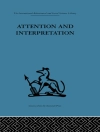Many clients take the first step to see a psychotherapist and do not return after the first session. Why do people disengage so early, when we have so much to offer? One of the key reasons is that we are too focused on conducting an Intake instead of finding a way to Give.
We have to find ways to deepen the engagement with our clients right from the first session of therapy.
The First Kiss is specifically for the discerning psychotherapist who is willing to challenge the status quo of our profession in the way we conduct our first sessions.
At the forefront of coaching psychotherapists and agencies in their professional development, psychologist and trainer Daryl Chow, MA, Ph.D. (Psych) provides compelling applicable ways to increase your impact, so as to reduce dropouts and achieve better outcomes.
By following the concepts in this book, you will also develop a perennial framework to sustain your lifelong development plan in improving your first sessions and beyond.
Table des matières
About the Author Lean Back: A Foreword by Scott D Miller
Introduction Infographic Section
Introduction to Breaking the Sacred Rules
1. Intake Second (Not First)
2. The Perils of an Intake Model
3. The 4P’s versus The 1P
4. Avoid TBU (‘ True But Useless’) Information
5. Make The Client First 6. Remove the Gatekeeper…
7. …If You Can’t, Be the Gate Opener.
8. Judge Your Assessment
9. Do The Prep
10. Listen in Order to Question, or Question in Order to Listen?
11. Gifting: Give a Gift
12. Secularise Spirituality
13. Assessing Risk From Both Sides
14. Get Over the Sacred Cow of “Adhering to The Model” Summary of Intake Model vs. Engagement Model
SECTION II: INCREASE YOUR IMPACT Introduction to Increasing Your Impact
15. Figure Out Your Client’s Circle of Development
16. How Do You Start a First Session? Orient.
17. How Do You Start a First Session? Reveal Yourself
18. How Do You Start a First Session? Regulate In-the-Moment Anxiety
19. “What is Your View of the Problem?”
20. The Goal May be to Figure Out the Goal 21. Define the Lead Story
22. Frame It
23. Gaining Consensus
24. Follow the Pain
25. Follow the Spark
26. What to Expect
27. The Role of Therapist
28. The Role of Client
29. Raising Expectations
30. Sweet Anticipation
31. Exercising Restraint: Tag It
32. Ask “Who?”
33. Past Attempted Solutions
34. Timely Questions
35. Timeless Questions
36. Timely and Timeless Questions?
37. Healing Questions
38. Don’t Just Empathise; Say It.
39. Call to Action
40. Be A “With-ness”
41. How Do You Close A First Session?
42. Don’t Just Ask for Feedback; Give Some.
43. Developing a Visual of Client’s Outcomes Summary of Key Points to Increasing Your Impact
SECTION III: BUILDING A CULTURE OF LEARNING
44. The Use of Routine Outcome Monitoring (ROM)
45. Why Use Formal Feedback?
46. Deliberate Practice
47. Individualised Learning Objectives
48. A Coach
49. Feedback
50. Successive Refinement
51. Performance Feedback Versus Learning Feedback
52. Eliciting Client Feedback
53. Receiving Client Feedback
54. Now, Let’s Play with Feedback
55. Recording Your First Sessions
56. Why Do We Need to Score Your First Sessions?
Conclusion: Any Old Map Will Do A Gift for You Gratitude Notes on Endnotes Notes
A propos de l’auteur
Daryl Chow, MA, Ph.D. (Psych) is a practicing psychologist and trainer. He is a senior associate of the International Center for Clinical Excellence (ICCE). He devotes his time to workshops, consultations and researches on the development of expertise and highly effective psychotherapists, helping practitioners to accelerate learning and improve client outcomes.
Based on his doctoral research on the role of deliberate practice in cultivating superior performance in psychotherapy, Daryl and colleagues’ 2015 peer-reviewed article was nominated the ‘Most Valuable Paper’ by the American Psychological Association (APA). His work is featured in two chapters of two edited books in 2017, Cycle of Excellence: Using Deliberate Practice to Improve Supervision and Training, and Feedback-Informed Treatment in Clinical Practice: Reaching for Excellence. He is the author of several articles, a contributor to edited books, and the co-editor of The Write to Recovery: Personal Stories & Lessons about Recovery from Mental Health Concerns.
Daryl’s blog, Frontiers of Psychotherapist Development, is aimed at inspiring and sustaining practitioner’s individualised professional development.
Currently, Daryl maintains a private practice with a vibrant team at Henry Street Centre, Fremantle, and continues to serve as a senior psychologist at the Institute of Mental Health, Singapore. In a previous life, he was a youth worker. He lives in Western Australia with his wife and two kids. He continues to obsess about the craft of psychotherapy and music.
For more information, visit darylchow.com.












